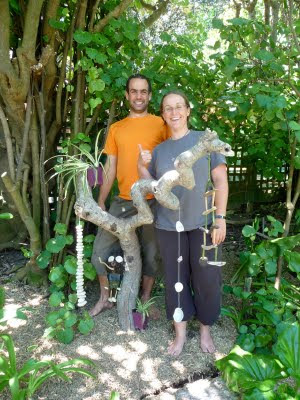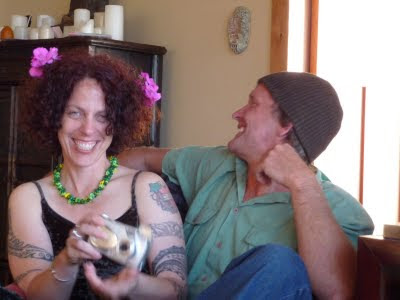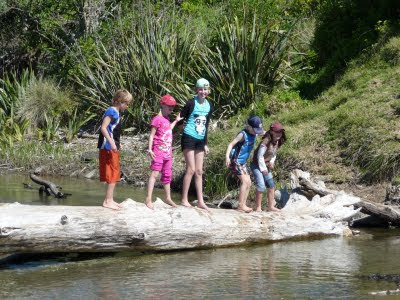
Ok, so it wasn’t the close I had in mind. In some ways, it was a most typical day here. A coaching call first thing, then an Action Learning Group call with Keith. Conversations about writing, about maybe turning this blog into a book (with lots and lots of editing—anyone know an interested publisher? An agent?). Kneading the challah for Hanukkah dinner. I had forgotten to invite S and A and their kids, and Melissa and Ayla wouldn’t be around. And Rob, just last night, had spent the first night in his
 new apartment in town. It was going to be an anti-climactic and small scale celebration.
new apartment in town. It was going to be an anti-climactic and small scale celebration.Naomi was coming home, though, from a school trip of two days in Wellington, and there would be the new menorahs I bought on the ill-fated trip to Philly. Michael had seen his, but Aidan’s was still a surprise. And there was delight in the air because (drum roll, please) today we closed on the Ocean Road house and finally we didn’t own it anymore—and Carolyn did. A movie finish.
And the movie got better, because Melissa called. Was she still welcome for dinner? It was raining and so they decided not to go camping tonight. And Rob texted, he was on
 the 5.40 train. So the house filled up as I made latkes for dinner with a bean thing that Rob made delicious when he arrived. I had forgotten the apple sauce and the sour cream; Michael had bought birthday candles instead of Hanukkah candles, but it would fit in the end.
the 5.40 train. So the house filled up as I made latkes for dinner with a bean thing that Rob made delicious when he arrived. I had forgotten the apple sauce and the sour cream; Michael had bought birthday candles instead of Hanukkah candles, but it would fit in the end.Latkes hot and sizzling on the platter, yummy beans and challah, fresh broccoli from the garden. We raised our glasses to drink our lovely New Zealand bubbly and toasted to Carolyn and Jim, to their owning the house and our not owning it anymore. We toasted to our current (and now only) house, to our fourth Hanukkah in New Zealand.
Hold that image, will you? The toasting adults, the cheerful children, the candles flickering in the gray late spring evening. A perfect close to this chapter in our lives, our best friend from the US, our best friend from NZ, our loving children, all gathered around as we sang the praises and delights of our dear friends in the US who have bought the extra house and may someday join us around the table.
And then, because it isn’t a movie, life begins again. Naomi discovers that it’s not a cell phone she’s gotten for Hanukkah and begins to cry at the table. Exhausted from her school trip, she stumbles off to bed without finishing her favourite dinner or finding out what the offending gift might be. Aidan, in lovely good spirits, dances excitedly about his gift. I give it to him, the best menorah I’ve ever seen, a dog, silly and very Aidan-like with a bobble head and wagging tail. He takes one look at it and bursts into tears—why would he want a menorah anyway? He gets horrified at his own reaction and cries louder—filled with self-recrimination and apologising for being so ungrateful. The adults hardly know what to do with this scene which is sweet and painful and terrible all at once. We move on to candle lighting. We struggle with the blessings, missing our old menorah with the Hebrew on the side, the one Rob and I bought for Michael 20 years ago in Rockville Maryland, the only item which broke in the move to New Zealand. Finally, betwe
 en us, we get both blessings out, and by now Aidan has calmed down and is making friends with the dog menorah, wanting to light the candles and nodding at its bobble head. And so this is life, candles glowing, children sometimes crying, sometimes delighted. Sometimes you sell the house when you want; sometimes you don’t. Sometimes you get the present you want; sometimes you don’t.
en us, we get both blessings out, and by now Aidan has calmed down and is making friends with the dog menorah, wanting to light the candles and nodding at its bobble head. And so this is life, candles glowing, children sometimes crying, sometimes delighted. Sometimes you sell the house when you want; sometimes you don’t. Sometimes you get the present you want; sometimes you don’t.Now the rain is lashing on the roof. Everyone is in bed—even Rob, who will take his time moving into the new flat in Wellington and whom, we hope hope hope, will still spend plenty of evenings here with us. Our children are shockingly older than they were when we first got here; our lives are settled and utterly different.
All of this means that I’m not sure I have much that’s interesting to say in this blog anymore to those of you who still come to follow our lives (except Dad, who would be interested in it all). My current hope is to take the story of these first years in New Zealand and see if I can edit them into a book with rising action, with a moving cast of characters, with a more polished presentation of words and ideas than I’ve been able to produce here, in the moment. Wish me luck with that one, with another book with no publisher. I’ll still sometimes post pictures or cool stories if they should happen, but this chapter, at least, this chapter of the move and the saga of the two houses and all the newness of a life in New Zealand, is over.
And of course, we don’t know what stories the next chapter holds. A book or two, finally published? A bat mitzvah without family, far from home? A 40th birthday and the accompanying grey hair? Perhaps I won’t do anything in my life as nutty as those things which have unfolded here. Perhaps this is the zenith of my attempts to shake up the past and move into a new future. All I know is that I w
 oke up one morning three years and three days ago and I lived in my dream house in Washington DC. And I’ll wake up tomorrow in my dream house in New Zealand. There have been tears and traumas and delights that I’d never have imagined. People often told us that we were courageous to strike out in this direction, and we said that courage and stupidity often described the same action, with only the outcome pointing to the right word. Tonight, as the owner of a single house on the beach in New Zealand, it feels like it was courage—with enough stupidity to keep the plot moving along. May you too, wherever you’re reading this, have the courage to strike out after your dreams. You might wake up in paradise too.
oke up one morning three years and three days ago and I lived in my dream house in Washington DC. And I’ll wake up tomorrow in my dream house in New Zealand. There have been tears and traumas and delights that I’d never have imagined. People often told us that we were courageous to strike out in this direction, and we said that courage and stupidity often described the same action, with only the outcome pointing to the right word. Tonight, as the owner of a single house on the beach in New Zealand, it feels like it was courage—with enough stupidity to keep the plot moving along. May you too, wherever you’re reading this, have the courage to strike out after your dreams. You might wake up in paradise too.ps Pictures today are somewhat random. Menorahs and walks on the beach--what could go together more clearly? Long time readers will see that we have found paradise in our Christmast tree for the first time. We've really made it now...














































